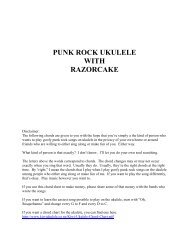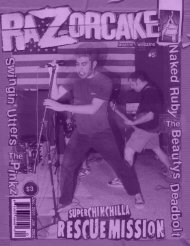You also want an ePaper? Increase the reach of your titles
YUMPU automatically turns print PDFs into web optimized ePapers that Google loves.
ather, to make polite excuses.” The<br />
excuse is a polite “no” which he<br />
addresses at face value. (Consider<br />
when someone invites you to an<br />
event you don’t want to go to. Do<br />
you say, “No, I don’t want to”? Or<br />
something like “Oh, I need to<br />
__________ that day,” which opens<br />
up the addressing of the excuse, not<br />
the thoughts behind it?)<br />
To even say “no,” a person<br />
needs to have the belief that saying<br />
“no” would have an effect, and<br />
sometimes that belief level is not<br />
there. Sex is a natural biological<br />
thing, like eating, but it has levels<br />
of spirituality, passion, and emotion.<br />
To be sexual in America in<br />
2003 combines your biochemistry,<br />
views on intergender and/or homosexual<br />
interactions as well as views<br />
on your and whatever gender the<br />
other person (people?) are with<br />
whatever views on sexuality your<br />
religion and upbringing put on you,<br />
mixed with whatever intellectual<br />
spin you put on it as you became<br />
your own person. Every sex act you<br />
engage in might have traces of<br />
every sex act you have ever had,<br />
along with any you may have<br />
viewed on TV or film, or heard<br />
from the other side of the wall.<br />
Now take all that and try and have<br />
a logical conversation with someone<br />
equally confused.<br />
“When she says ‘no,’ it’s rape.”<br />
What if she says “yes” because he<br />
framed the situation falsely, like<br />
forgetting to mention his other sex<br />
partners, or in one case I know,<br />
removing the condom halfway<br />
through? What if she is in no position<br />
to say anything? What if HE is<br />
in no position to say anything? If<br />
both man and woman blacked out<br />
from drugs or alcohol, but had sex,<br />
can you say it was consented to? If<br />
two people BOTH get drunk and<br />
wake to find that they had sex, how<br />
do they know who initiated and<br />
thus was responsible for getting<br />
consent? What if she wants sex and<br />
HE says “no,” or “not a good<br />
idea”? What if he passed out and<br />
woke up to her having sex with<br />
him? By the way, that last example<br />
happened to me. Does that mean I<br />
have been raped? I’m just asking to<br />
ask.<br />
Ever see Revenge of the Nerds?<br />
There is a scene where one nerd<br />
puts on the same costume as one of<br />
the jocks and has sex with the<br />
cheerleader who dates that jock<br />
because she thinks it’s her<br />
boyfriend, since they have the same<br />
costume on. Not only is this<br />
implausible, but it’s a form of rape.<br />
But in the movie, the way he<br />
expressed his love and gained hers<br />
was celebrated.<br />
When some people first start<br />
really thinking about consent<br />
issues, they wonder if anyone ever<br />
has consenting sex. Some militant<br />
feminists such as Andrea Dworkin<br />
and Catharine MacKinnon have<br />
equated all heterosexual sex with<br />
rape, and in doing so wrongly<br />
accuse men in general and present<br />
an extreme feminism that borders<br />
on self-parody. But there are many<br />
others, perhaps less known because<br />
of less shocking views, who are<br />
more optimistic. Joseph Weinberg,<br />
in his essay in “Transforming a<br />
Rape Culture,” suggests that sex is<br />
more erotic when it’s a sharing of<br />
power, not a power struggle.<br />
“Power with” instead of “power<br />
over.” This makes me ask, Who do<br />
you think should have more say<br />
about sexuality? Those who like<br />
sex or those who don’t?<br />
We do, and will, and can have<br />
both passion and concern about<br />
consent, but we need to spend a<br />
moment here and there to check the<br />
situation and see exactly how both<br />
(or all, I guess) parties stand. If the<br />
idea of sex is supposed to be pleasurable,<br />
don’t we all want the other<br />
person to feel pleasure too? Think<br />
about how much more willing people<br />
tend to do something when they<br />
feel like their interest level is being<br />
considered and respected? We can<br />
still have sex; we just need to spend<br />
a few seconds thinking about what<br />
to say and how to say it first. Some<br />
express the concern of “Simon<br />
Says Sex”: “Do you consent to<br />
THIS? Do you consent to THIS?”<br />
The widely acclaimed Antioch policy<br />
mentions stopping for verbal<br />
consent at each stage of an<br />
encounter, but what exactly counts<br />
as a stage? Maybe we don’t need to<br />
worry about every little step if we<br />
start relationships and encounters<br />
with more openness, honesty, communication<br />
and respect. I think a<br />
few key words here are judgement<br />
and foresight.<br />
Not to get all on blaming “the<br />
system,” but the way a lot of media<br />
is, we are trained to meet strangers<br />
in exciting situations, and by mere<br />
proximity find sexual compatibility.<br />
The way the judicial system<br />
seems to work as a moral code is<br />
that we feel bad not for what we do<br />
wrong, but to feel bad if we get<br />
caught. The restorative justice<br />
movement is even centered around<br />
the lack of being accountable for<br />
the HARM someone does to others<br />
and making amends, as opposed to<br />
the more abstract idea of “breaking<br />
a rule” so you should be punished.<br />
Meanwhile, much of the recent discussions<br />
about sexual assault in<br />
“radical” communities center on<br />
definitions. Definitions can be<br />
helpful, but less important (in my<br />
opinion) than what you call something<br />
is how it impacts the lives of<br />
people.<br />
–Rich Mackin<br />
Books used as resources/<br />
reading list:<br />
Beyond the Blame Game, by Dmitri<br />
Bilgere, 1997, MPC Press (recommended)<br />
Boys Will be Men: Raising our Sons<br />
for Courage, Caring, and Community,<br />
by Paul Kivel, 1999, New Society<br />
Publishers<br />
Cunt: A Declaration of Independence,<br />
by Inga Muscio, 2002, Seal Press (recommended)<br />
Feminism Is for Everybody by Bell<br />
Hooks, 2000, South End Press (recommended)<br />
Gender Outlaw: On Men, Women, and<br />
the Rest of Us, by Kate Bornstein,<br />
1995, Vintage Books (Highly recommended)<br />
Good Will Toward Men, by Jack<br />
Kramer, 1994, St. Martin’s Press<br />
I Never Called It Rape, by Robin<br />
Warsaw, 1988, Ms. Foundation/ Sarah<br />
Lazin Books<br />
Manhood in America, by Michael<br />
Kimmel, 1996, The Free Press (recommended)<br />
Men’s Work, by Paul Kivel, 1992,<br />
Ballantine Books (Highly recommended)<br />
My Gender Workbook: How to<br />
Become a Real Man, a Real Woman,<br />
the Real You, or Something Else<br />
Entirely, by Kate Bornstein, 1998,<br />
Routledge (recommended)<br />
No Is Not Enough: Helping Teenagers<br />
Avoid Sexual Assault, by Caren<br />
Adams, M.A., Jennifer Fay, M.A., Jan<br />
Loreen-Martin, M.A., 1984 Impact<br />
Publishers<br />
Psychic War in Men & Women, by<br />
Helen Block Lewis, 1976, NYU Press<br />
(Highly recommended. It discusses<br />
gender in cultural and anthropological<br />
levels, not just in modern culture.)<br />
Refusing to be a Man, by John<br />
Stoltenberg, 1989, Breitenbush Books<br />
Inc.<br />
(Note that I used this as a resource.<br />
Some parts are great food for thought,<br />
others, well, just wait until you read<br />
the section about how men want to<br />
father boys in order to avenge their lost<br />
erections.)<br />
The Secret Life of Men, by Steve<br />
Biddulph,1994, 2003, Marlowe and<br />
Company (recommended)<br />
Sex on Your Terms, by Elizabeth<br />
Powell, 1996, Allyn and Bacon (recommended)<br />
Sex, Power and Boundaries:<br />
Understanding and Preventing Sexual<br />
Harassment, by Peter Rutter, M. D. (A<br />
good book, but not really worth reading<br />
unless you are doing research.<br />
Mostly discusses workplace and legal<br />
issues.)<br />
Sexual Violence and American<br />
Manhood, by T Walter Herbert, 2002,<br />
Harvard University Press<br />
That’s Not What I Meant! by Deborah<br />
Tannen, Ph.D., 1986, Ballentine Books<br />
(recommended)<br />
Transforming a Rape Culture, edited<br />
by Emilie Buchwald, Pamela Fletcher,<br />
and Martha Roth, 1993, Milkweed<br />
Editions.<br />
You Just Don’t Understand: Women<br />
and Men in Conversation, by Deborah<br />
Tannen, Ph.D., 1991, Ballentine Books<br />
(Highly recommended)<br />
21<br />
RICH MACKIN
















